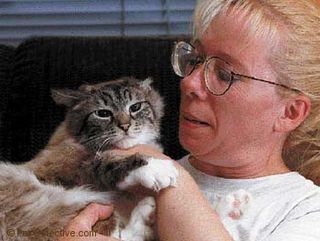Altruism
3 Inspiring Stories of Everyday Compassion
A secret Santa, a pet dectective, and a tutor for kids are changing the world.
Posted December 30, 2016
I’ve spent twenty-five years writing stories about people who are making a difference in their communities, and sometimes the world, through acts of compassion. Now, more than ever, we must choose compassion, every chance we get. Here are three inspiring stories of folks who have made the world a little brighter for others in totally different ways. I hope they make you smile, and provide some hope for the coming year.
The Secret Santa of Kansas City
The "Secret Santa" of Kansas City spent more than 30 years spreading holiday cheer to those who least expected it. "I give folks who need a lift some holiday magic to believe in,” says the mysterious philanthropist who gave away $65,000 last holiday season alone, much of it in $100 bills, including a Secret Santa mission to San Diego in the wake of the biggest fire in California’s history. “I’ve been at rock bottom myself -- 30 years ago I was an out-of-work salesman living in my car in Houston, Mississippi. I’ll never forget the diner owner who gave me $20 for a good breakfast and a tank full of gas to drive out of town.”
Ten years later, employed at a secure job in Kansas City, and married with two young children, Secret Santa struck for the first time. A few days before Christmas, he decided to pass along his blessings by giving a waitress at a drive-in a $50 tip. Her eyes filled with tears as she told him he had no ideas what his gift meant to her. “I thought of how that diner owner’s kindness has given me a second chance, and a light bulb went off in my head about how to repay him.”
That first year, Secret Santa gave away $400 in $20 bills. Since then, the successful entrepreneur increases his generosity as his own good fortune continues to grow. “He’d go down to the railroad tracks or just stop people on the street and hand out $100 bills,” says Mike Strong, a police officer who escorted Santa into some of Kansas City’s rougher neighborhoods in 1999 and 2000 and is sworn to secrecy about his identity. “The look in folks’ eyes as they just melt with disbelief and joy is a real thrill to see.” Santa has also handed out cash and holiday cheer in New York after 9-11, and in Washington D.C. after the rash of snipers in 2002. Not long before he passed away in 2007, the Secret Santa of Kansas City returned to Houston to surprise the diner owner who started it all. “At the time, that $20 seemed like $10,000 to me,” Santa says. So, that’s how much he gave the surprised elderly gentleman and his ailing wife ($10,000!). (Originally published in Family Circle.)
It’s Elementary My Dear Fido

People as far away as South Africa have called Melody Pugh in Bremerton, Wash. to help them find a beloved family member. “I learned early that people might betray you and abandon you, but animals never will,” says Pugh, who was sexually abused as a child. She now lives with her husband and seven cats she’s rescued from snow banks, dumpsters, and other abuse. The country's only licensed and bonded “pet detective," this 58-year-old former police officer is an expert on thinking like a dog or cat.
It all started in April 1998 when her beloved kitty, Norman, bolted from the car after arriving at the vet's office. Pugh searched for Norman for 95 days, quitting her job because the search became all-consuming, and during that time she found 27 other lost pets. That’s when she discovered she had a nose for finding clues -- a paw print here, a broken spider web there, a familiar tuft of fur. A newspaper carrier who recognized the bedraggled cat from one of 2,000 flyers Melody put up trapped him and called her to make the catch.
“Family and friends start to give up after a few week, saying it’s time to move on and forget your missing pet,” Pugh recalls with a catch in her voice. “But how could I do that to Norman? He was depending on me to love him enough to find him, just like he’s always been there for me.”
While there are other pet finders, Pugh is the only person in the U.S. registered with the IRS as a licensed pet detective -- and there’s a big difference. “Pet finders may make flyers and phone calls, but they won't actively track your pet or get personally involved because they aren’t bonded and can't afford to get sued,” says Pugh, who has never been sued. She was able to obtain a Private Investigator’s license from the State of Washington in 2001 because of her background in law enforcement.
Pugh has returned more than 1,000 dogs, cats and rodents to their homes in virtually every state nationwide. Nearly two million companion animals are stolen each year, often right from their owner’s yard, and then sold to research laboratories, dog-fighting rings, or puppy mills. “I’ll do whatever it takes to help animals in need because if I don’t do it, the who will?” Pugh says solemnly. "If someone loses a pet, I'll stick with them until they find it. If someone steals a dog, I'll follow the leads until I track that person down and make their life a little bit miserable. If a kitten is abandoned, I'll find that tiny scared animal a forever home. I do it all because these animals are counting on me." (Originally published in Good Housekeeping.)
Rosie’s Garage
Not long after Rose Espinoza and her husband, Eliasar, moved into their first home in Brea, California in 1991, they started wondering if they’d made a huge mistake. “Boys with baseball bats hung out on the corners and they weren’t looking for a pick-up game,” recalls the 65-year-old electromechanical designer. “After a drive-by shooting on our street, we started to really worry about the safety of our eight-year-old son, Chris. I thought, ‘What had we gotten our family into?’”
The Espinozas initiated a neighborhood watch group, but the morning after the first meeting a clear message was spray-painted on their truck, ‘Don’t finger us, keep your mouth shut.” Rose knew she had to take a different approach to the problem, so she went directly to the root. In September 1991, she transformed her two-car garage into a free after-school K-12 tutoring program, Rosie’s Garage, complete with computers, books, and banners for kids who made the honor roll.
“We started by offering homework help and free lemonade, and 16 kids showed up the very first day,” recalls Espinoza, who recruited high school students with solid grades as tutors. “This was the first tutoring program in the neighborhood, and it was clear that these kids really did want to learn.”
Rosie’s Garage literally transformed the Espinoza’s neighborhood; within two years, academic scores went up and the crime rate went down. And it’s such a great idea that it’s spreading: there are now four sites one in Brea and three in the neighboring towns of Santa Ana and La Habra that have served about 200 children at any given time. (Originally published in O, The Oprah Magazine.)
(End)




